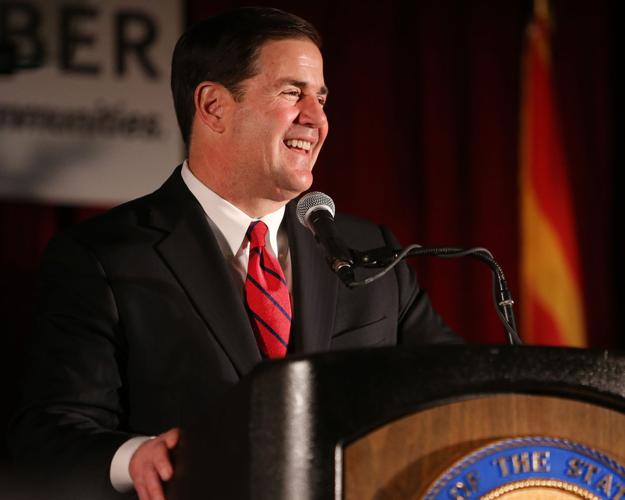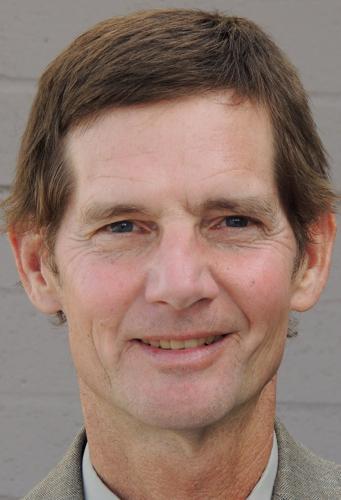PHOENIX — Gov. Doug Ducey refused Tuesday to force Arizona to join with other states to restrict what kind of gun laws each can adopt.
But he did not hesitate to sign a new law that will let individuals sue local governments that enact their own firearms laws. While that measure applies statewide, it is aimed largely at Tucson, which has three specific ordinances that gun-rights advocates find offensive.
The governor also penned his approval to another law creating an exception to prohibitions of firearms on the campuses of public universities and colleges. It says people do not have to disarm themselves when they walk or drive on public streets and sidewalks going through a campus.
In a veto message on HB 2524, Ducey said he is a strong supporter of the Second Amendment right to bear arms.
But he said what was in the proposal by Rep. Bob Thorpe, R-Flagstaff, essentially would surrender Arizona’s right to decide what laws it does and does not want about things like requiring background checks when a firearm is purchased.
“I believe it’s important that Arizona continue to chart its own course and retain its sovereignty,” he wrote in his veto message.
Thorpe’s legislation would have required Arizona to enter into compacts with one or more states, with each agreeing not to enact new laws on the transfer of firearms. That would have tied the hands not only of future legislatures but also preempted the constitutional right of Arizona voters to propose their own gun laws.
Ducey said he has nothing against protecting the rights of gun owners. But the governor said these are Arizona decisions, unfettered by any interstate compact.
“I see no reason for Arizona to tie ourselves to other states’ decisions on public policy relating to the transfer of firearms,” he wrote.
Ducey did sign SB 1266.
Existing law says local governments cannot enact any rules or regulations dealing with the transportation, possession, sale, transfer, purchase, storage, registration, discharge or use of firearms or ammunition.
The problem, according to Sen. Steve Smith, R-Maricopa, is there is no enforcement mechanism.
His poster child is Tucson.
The city adopted one ordinance that requires gun owners to report to police when a firearm is lost or stolen. Another allows police to request a breath sample from someone who negligently discharges a firearm and appears intoxicated.
Former Attorney General Tom Horne, in a formal legal opinion, declared both measures to be illegal. The response of the city was, in essence, to ignore him.
This new law, which takes effect Aug. 6, declares such ordinances invalid and allows a court to assess civil fines up to $50,000 for any knowing and willful violation of the state pre-emption law. Potentially more significant, it says a judge can have a person who enacts or enforces such a local law removed from office.
And it separately permits any individual or group whose members are “adversely affected” by any local ordinance to bring their own legal action and collect damages up to $100,000.
Tucson Councilman Steve Kozachik, who supports the ordinances, said Tuesday he sees no reason to repeal either measure, even with the new threat.
“These are reasonable accommodations to public safety,” he said.
“Our constituents, my constituents, have asked for them,” Kozachik said. “And if the state Legislature and the governor want to meet us at the courthouse steps, let’s just do that.”
Horne, in his 2013 legal opinion, said Tucson cannot require people to report the loss or theft of a gun to police because it relates to the “possession or transfer of firearms,” something that only the state can regulate.
And Horne said the $100 civil penalty for failing to report a missing gun conflicts with another law that bars gun ordinances that have a penalty greater than what exists in state law. Since there is no penalty under state law, that would make even a $1 fine illegal.
Kozachik defended the ordinance as “eminently reasonable.”
“If somebody steals your gun, let the police know there’s a hot gun floating around in the neighborhood,” he said.
Horne also said the city lacks the legal authority to allow police to request a breath sample from an apparently intoxicated person who shoots a gun. He said the state laws bar cities from passing laws relating to the “discharge and use of firearms.”
And Kozachik sniffed at Smith’s reliance, in pushing SB 1266, on Horne being correct.
“It was his opinion, which everyone has,” the councilman said. “And his is not superior to anybody else’s.”
Ducey, however, defended his decision to sign the measure.
“The governor has been clear he is committed to protecting the Second Amendment rights of Arizonans and stopping any policies that stand in the way of those constitutional rights,” spokesman Daniel Scarpinato said in a prepared statement.
Ducey’s signature on SB 1266 drew praise from the National Rifle Association.
“Enhancing the state’s pre-emption laws guarantees that every Arizonan will be held to the same standards whether they live in Tempe or Tucson,” spokesman Lars Dalseide said in a prepared statement. “Now safe and responsible gun owners won’t suddenly become criminals simply because they cross an imaginary line.”
But Kozachik suggested that lawmakers who approved the measure have a problem.
“The gun guys in the state Legislature suffer some sort of separation anxiety when they think about being separated from their guns for minutes at a time,” he said. And he said there is nothing inconsistent between the Second Amendment and regulations like requiring stolen firearms to be reported.







